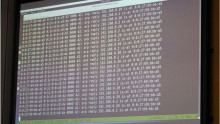Iran 'foils second cyber-attack in a week'
Iran has foiled a second cyber-attack in less than a week, the country's telecommunications minister says.
Mohammad Javad Azari-Jahromi announced on Twitter that the cyber-attack had targeted Iranian electronic government systems. The minister did not give details. A similar claim was made about Wednesday's "massive" attack.













































































